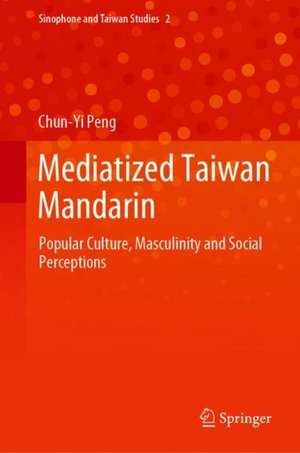Mediatized Taiwanese Mandarin: Popular Culture, Masculinity, and Social Perceptions: Sinophone and Taiwan Studies, cartea 2
Autor Chun-Yi Pengen Limba Engleză Hardback – 12 mar 2021
| Toate formatele și edițiile | Preț | Express |
|---|---|---|
| Paperback (1) | 676.57 lei 6-8 săpt. | |
| Springer Nature Singapore – 13 mar 2022 | 676.57 lei 6-8 săpt. | |
| Hardback (1) | 682.67 lei 6-8 săpt. | |
| Springer Nature Singapore – 12 mar 2021 | 682.67 lei 6-8 săpt. |
Preț: 682.67 lei
Preț vechi: 803.13 lei
-15% Nou
Puncte Express: 1024
Preț estimativ în valută:
130.72€ • 134.84$ • 108.34£
130.72€ • 134.84$ • 108.34£
Carte tipărită la comandă
Livrare economică 20 februarie-06 martie
Preluare comenzi: 021 569.72.76
Specificații
ISBN-13: 9789811542213
ISBN-10: 981154221X
Ilustrații: X, 109 p. 28 illus., 8 illus. in color.
Dimensiuni: 155 x 235 mm
Greutate: 0.35 kg
Ediția:1st ed. 2021
Editura: Springer Nature Singapore
Colecția Springer
Seria Sinophone and Taiwan Studies
Locul publicării:Singapore, Singapore
ISBN-10: 981154221X
Ilustrații: X, 109 p. 28 illus., 8 illus. in color.
Dimensiuni: 155 x 235 mm
Greutate: 0.35 kg
Ediția:1st ed. 2021
Editura: Springer Nature Singapore
Colecția Springer
Seria Sinophone and Taiwan Studies
Locul publicării:Singapore, Singapore
Cuprins
Introduction: gangtai qiang.- Taiwanese Mandarin: a sociolinguistic overview.- Media effects on language perceptions.- Performed cuteness: the mediatization of Taiwanese Mandarin.- New masculinities in online discourse: a text-mining approach.- Changing attitudes and waning prestige.
Notă biografică
Chun-Yi Peng is an Associate Professor at Borough of Manhattan Community College, CUNY. His primary research interests are in the fields of sociolinguistics and linguistic anthropology. His research examines the ideological perceptions of Taiwanese Mandarin by Chinese Mainlanders, and how televised media and language attitudes play a role in shaping such perceptions. Chun-Yi is also interested in second language acquisition and dialect contact, especially syntactic variation in spoken Mandarin varieties. His work on Taiwanese Mandarin has also been featured in mass media.
Textul de pe ultima copertă
This book explores how language ideologies have emerged for gangtaiqiang through a combination of indexical and ideological processes in televised media. Gangtaiqiang (Hong Kong-Taiwan accent), a socially recognizable form of mediatized Taiwanese Mandarin, has become a stereotype for many Chinese mainlanders who have little real-life interaction with Taiwanese people. Using both qualitative and quantitative approaches, the author examines how Chinese millennials perceive gangtaiqiang by focusing on the following questions: 1) the role of televised media in the formation of language attitudes, and 2) how shifting gender ideologies are performed and embodied such attitudes. This book presents empirical evidence to argue that gangtaiqiang should, in fact, be conceptualized as a mediatized variety of Mandarin, rather than the actual speech of people in Hong Kong or Taiwan. The analyses in this book point to an emerging realignment among the Chinese towards gangtaiqiang, a variety traditionally associated with chic, urban television celebrities and young cosmopolitan types. In contrast to Beijing Mandarin, Taiwanese Mandarin is now perceived to be pretentious, babyish, and emasculated, mirroring the power dynamics between Taiwan and China.
Caracteristici
Discusses the socio-cultural relationship between Taiwan and China Is the first academic work analyzing the popular stereotypes of the so-called “Taiwan qiang” Provides innovative methodology for the study of dialectology






